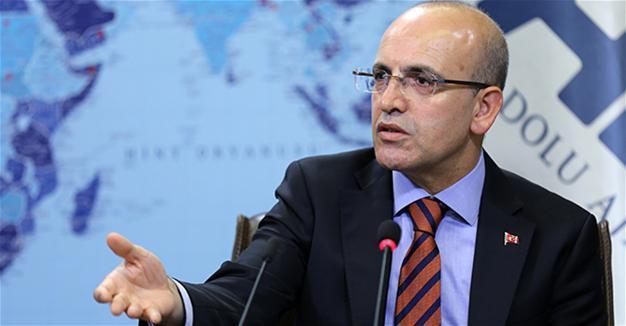Moody’s rating downgrade not related to defeated coup, but ongoing structural problems: Şimşek
ANKARA
 Deputy Prime Minister Mehmet Şimşek has said the July 15 coup attempt was not the main cause behind the Moody’s rating downgrade but rather that ongoing structural problems were to blame, adding that Turkey would overcome these issues and make efforts to address structural problems rather than succumb to emotions after the downgrade.
Deputy Prime Minister Mehmet Şimşek has said the July 15 coup attempt was not the main cause behind the Moody’s rating downgrade but rather that ongoing structural problems were to blame, adding that Turkey would overcome these issues and make efforts to address structural problems rather than succumb to emotions after the downgrade.“Turkey’s rating downgrade by Moody’s was not related to the defeated coup, but ongoing structural problems… Turkey will respond to the rating downgrade by resolving its problems and making the required reforms,” said Şimşek, while speaking at Anadolu Agency’s Editor’s Desk in Ankara on Sept. 29.
“We take this issue seriously, as it is of significance. We will work intensively to enable our rating to upgrade again… If the country rapidly implements structural reforms within one or two years, [then] its outlook will turn positive and [the] rating upgrade will follow,” he added.
He noted that the rating downgrade by Moody’s was a serious matter, but not the end of the world, as the markets did not only look at the decisions by Moody’s, Standard&Poor’s or Fitch.
“The markets and investments funds actually move much faster and make more analyses of higher quality than the ratings agencies do,” he added.
Şimşek said the rating downgrade has had fewer effects on the Turkish economy than such decisions recently made over Brazil or others, as Turkey’s macroeconomic fundamentals were quite robust and a potential downgrade was already priced by the markets.
Moody’s Investor Service downgraded Turkey’s sovereign credit rating to non-investment grade citing worries about the rule of law following the attempted coup, risks from external financing and a slowing economy late Sept. 23. The Moody’s decision followed a reduction to two notches below investment grade by S&P in the immediate aftermath of the coup in July. Fitch Ratings is the only major ratings agency that has Turkey as investment grade.
S&P ‘acted too hastily’
Şimşek noted the downgrade by S&P created a downward pressure over other agencies.
“We wish they had then built contact with us. If we had talked about that the effects of the coup attempt would be limited, S&P might not have acted that faster. Besides, they visited us in Ankara following their downward decision. As far as I have observed, they are not happy with their rushed decision. A new review may be the case in November,” he added.
Şimşek also said Turkey has faced many disasters in the last few years, creating a pressure over the country’s perception abroad, adding that Turkey faced difficulties in informing about its fight against the Gülen movement both inside and abroad.
“When chatting with foreign journalists, I sometimes compare their [Gülenists] ways of doing things to what happens in Dan Brown’s books or the Jason Bourne movie series. We are talking about an international and local organization which is active in 170 countries, acting in tremendous secrecy to seize power illegally. Turkey has worked to overcome this danger and fought against it,” he added.
“We take this issue seriously, as it is of significance. We will work intensively to enable our rating to upgrade again… If the country rapidly implements structural reforms within one or two years, [then] its outlook will turn positive and [the] rating upgrade will follow,” he added.
He noted that the rating downgrade by Moody’s was a serious matter, but not the end of the world, as the markets did not only look at the decisions by Moody’s, Standard&Poor’s or Fitch.
“The markets and investments funds actually move much faster and make more analyses of higher quality than the ratings agencies do,” he added.
Şimşek said the rating downgrade has had fewer effects on the Turkish economy than such decisions recently made over Brazil or others, as Turkey’s macroeconomic fundamentals were quite robust and a potential downgrade was already priced by the markets.
Moody’s Investor Service downgraded Turkey’s sovereign credit rating to non-investment grade citing worries about the rule of law following the attempted coup, risks from external financing and a slowing economy late Sept. 23. The Moody’s decision followed a reduction to two notches below investment grade by S&P in the immediate aftermath of the coup in July. Fitch Ratings is the only major ratings agency that has Turkey as investment grade.
S&P ‘acted too hastily’
Şimşek noted the downgrade by S&P created a downward pressure over other agencies.
“We wish they had then built contact with us. If we had talked about that the effects of the coup attempt would be limited, S&P might not have acted that faster. Besides, they visited us in Ankara following their downward decision. As far as I have observed, they are not happy with their rushed decision. A new review may be the case in November,” he added.
Şimşek also said Turkey has faced many disasters in the last few years, creating a pressure over the country’s perception abroad, adding that Turkey faced difficulties in informing about its fight against the Gülen movement both inside and abroad.
“When chatting with foreign journalists, I sometimes compare their [Gülenists] ways of doing things to what happens in Dan Brown’s books or the Jason Bourne movie series. We are talking about an international and local organization which is active in 170 countries, acting in tremendous secrecy to seize power illegally. Turkey has worked to overcome this danger and fought against it,” he added.
















